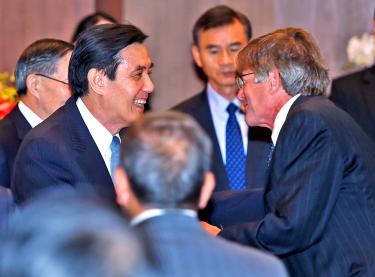President Ma Ying-jeou (馬英九) yesterday cast doubt on Democratic Progressive Party (DPP) presidential candidate Tsai Ing-wen’s (蔡英文) proposal to maintain the cross-strait “status quo” if elected, urging the DPP chairperson to offer a clear definition of what she means by “status quo.”
“Recently, the chairperson of Taiwan’s largest opposition party said that if she is elected president, she plans to maintain the ‘status quo,’” Ma said in his opening speech at the Taiwan-US-Japan Trilateral Security Dialogue in Taipei.
However, Ma said no one knows whether the “status quo” Tsai referred to was the “status quo of peace and stability” that his administration has created and enjoyed for the past seven years.
“Or, is she talking about the ‘status quo’ that preceded my administration, in which there was no cross-strait foundation of mutual trust and the ‘status quo’ consisted of Taiwan being perceived by the international community as a troublemaker?” Ma said. “I certainly hope [Tsai’s version of] the ‘status quo’ is the former, rather than the latter.”
Ma was referring to remarks Tsai made at a public event in Washington in June, during which she reiterated her commitment toward maintaining the cross-strait “status quo.”
Tsai also vowed that if elected, she would push for the peaceful and stable development of cross-strait relations in accordance with “the will of the Taiwanese people and the existing Republic of China [ROC] constitutional order.”
Ma went on to tout his oft-stated “viable diplomacy” policy, which he said has promoted cross-strait reconciliation based on the so-called “1992 consensus,” expanded Taiwan’s presence in the international arena and put an end to what he called his predecessor’s scorched earth and checkbook diplomacy.
The “1992 consensus,” a term former Mainland Affairs Council chairman Su Chi (蘇起) admitted making up in 2000, refers to a tacit understanding between the Chinese Nationalist party (KMT) and the Chinese government that both sides of the Taiwan Strait acknowledge that there is “one China,” with each side having its own interpretation of what “China” means.
“Over the past seven years, the ROC’s international image has gone from troublemaker to peacemaker, and in the international community, the ROC has become an asset rather than a liability,” Ma said, adding that the policy has enhanced the nation’s relationship with both the US and Japan, bringing the three nations closer than ever and forging the strongest-ever bond of mutual trust among them.
Tsai’s campaign office had made no response to Ma’s comments as of press time last night.
However, last month Tsai said her plan consisted of two parts: maintaining the constitutional system and the free and democratic lifestyles of Taiwanese; and emphasizing the development of a peaceful and stable cross-strait relationship.
She also criticized Ma, challenging his administration’s record on improving the public’s freedom and democratic way of life and in ensuring transparency in the government’s policymaking process.
Separately yesterday, US Pacific Fleet Commander Admiral Scott Swift was equivocal when responding to questions over a possible US reaction in the event of a war across the Taiwan Strait.
“That is really a policy question, so it is dependent upon how a conflict might evolve... But the conditions if a conflict might break out are so hypothetical in nature that I really can’t speak specifically to how the US might react,” Swift said.
As for the possibility of Taiwan being invited to next year’s Rim of the Pacific (RIMPAC) military exercises in Hawaii, Swift said the invitation process for RIMPAC is a US government decision and he was not in a position to comment.
Source: Taipei Times - 2015/08/26





















